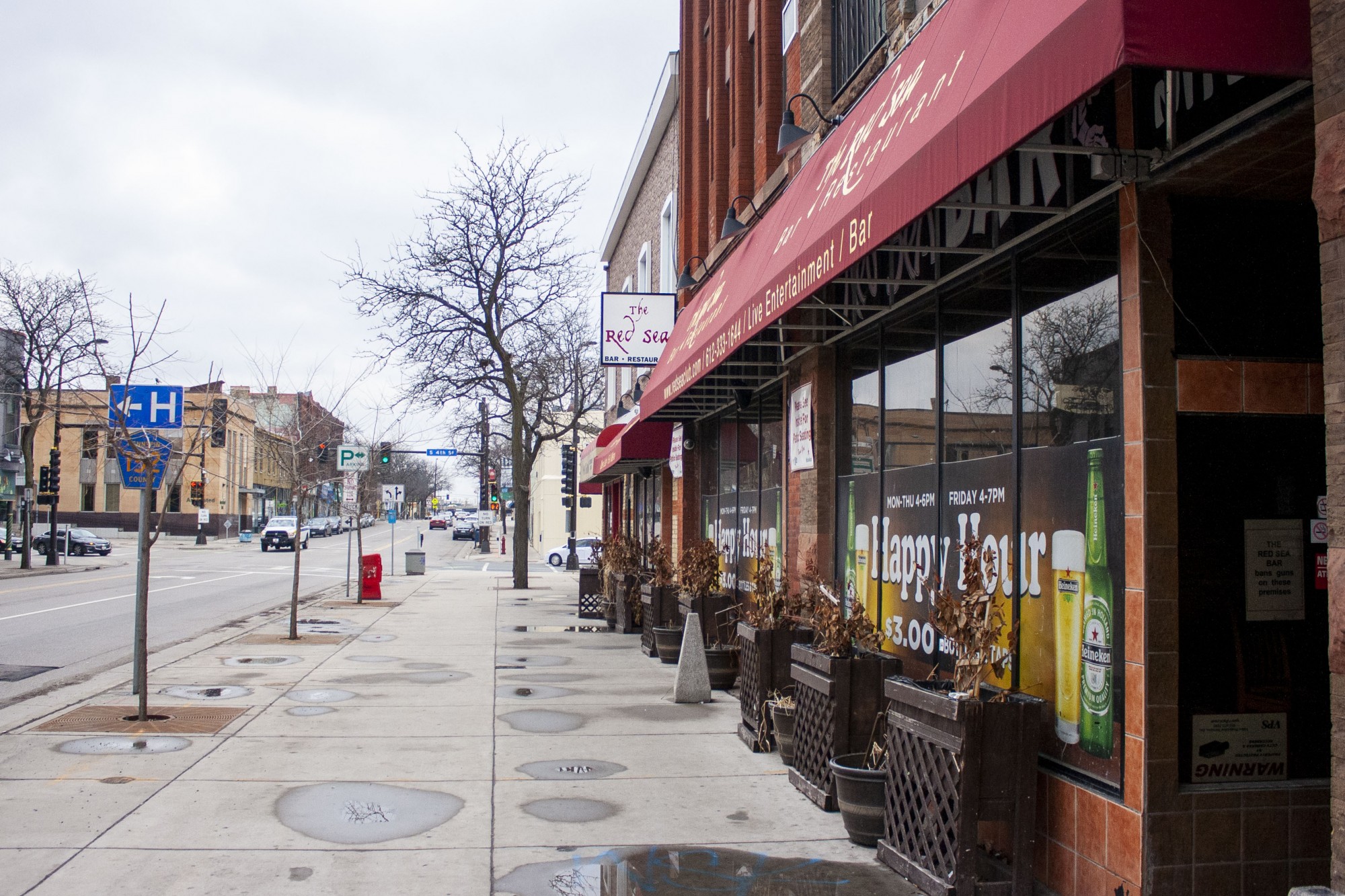Although kids are home during school closures, the playground at the Riverside Plaza apartments was empty Monday afternoon.
The Cedar-Riverside neighborhood is densely packed with a vulnerable population of immigrant elders and youth, and residents are taking measures to mitigate the threat of a COVID-19 outbreak. Leaders and officials are educating the locals, people are staying home and businesses closed their doors to comply with a statewide mandate. Some said the quarantine is taking a toll, and the effects could be felt in the long term.
Two major bedrocks to the community, the Cedar-Riverside Opportunity Center and the Brian Coyle Center, have mostly shuttered in recent days. The three neighborhood mosques have also closed.
The neighborhood, which is usually bustling with social gatherings and events, is largely barren.
“It’s completely quiet,” said Amano Dube, director of the Brian Coyle Center. “It’s boring, but what can you do?”
Neighbors come together in uncertainty
The pandemic has fostered anxiety in Cedar-Riverside, yet many have banded together for support.
“It’s a lot of fear in the community, it’s a lot of fear. People don’t know how long this will go on,” said community organizer Abdirizak Bihi. “Every talk we have is about the virus.”
Rumors spread quickly about supposed cases of the virus reaching the neighborhood, but Bihi said it has been difficult to confirm facts.
Bihi said residents have taken the virus seriously and followed recommendations sent down by health officials, like practicing social distancing. Many are covering their faces and wearing gloves, and informational flyers are posted throughout the area.
Even before the mosques closed and the state saw widespread outbreak, Muslim leaders had already moved prayers online.
“I was really surprised on the fast response,” Bihi said.
The Cedar-Riverside Community Council has formed a Coronavirus Response Team, which will organize 10 young adults to assist families and elders with getting groceries and food. Sisco Omar, secretary with the CRCC and community organizer at Mixed Blood Theater, is heading the group. Omar said this offers jobs to younger people while providing a service to the neighborhood.
The team is also working on videos in various languages, including Somali and Oromo, to educate people about safety measures.
Other local organizations have also stepped up, including Hennepin County and People’s Center clinic, which has built awareness and ensured basic needs are met in Cedar-Riverside.
Local officials, including Ward 6 Council member Abdi Warsame and Minneapolis Mayor Jacob Frey, took to Somali TV to emphasize the seriousness of social distancing and other preventative measures.
“Apart from the fear and the confusion, we are seeing the Minnesota culture,” Bihi said. “Every time when fear comes along — whether it’s violence or the fire in our high rises or this pandemic — we get together, and people really are working together.”

Weathering the storm
Despite canceling most programming, the Brian Coyle Center is maintaining its food shelf — distributing pre-filled bags Monday, Wednesday and Friday out of a side door — while the opportunity center is still working with people to file for unemployment and find jobs.
Ganga Acharya, a basic needs coordinator at the Brian Coyle Center, said the food shelf team is taking extra precautions to minimize contact. They are wearing gloves and keeping people at the door rather than inviting them in.
Amano Dube, from the Brian Coyle Center, said food needs could increase as more workers are laid off.
“They could be losing jobs. They could be losing income, and we expect more food needs,” he said.
Abdirizak Bihi said he has been advocating for greater resources for the food shelf and the community’s clinic in light of COVID-19.
“It’s really taking a toll on the community in terms of our businesses and our jobs. People are feeling the pain,” he said.
In one of the densest neighborhoods in Minneapolis, residents have felt the strain of limited community space. For a typically bustling community, “Suddenly, we are in prison,” Bihi said.
A few hundred small businesses in the neighborhood are exploring their options while residents stay home. The closure of entertainment venues and absence of students on campus has nearly halted traffic into the area, which many restaurants depend on.
People are also more frugal with uncertainty on the horizon, said Red Sea restaurant owner Russom Solomon, and restaurants are taking the hit. He had to close Red Sea’s venue and bar and has shifted his restaurant to takeout only. He said moving forward is going to be tough.
West Bank Business Association has been helping such businesses to attain small business loans during the pandemic and connecting them to other resources.
“But a loan’s a loan, you know,” Solomon said. “It’s gonna be tough times ahead, you know. We’ll do everything we can to survive.”
Early in the crisis, some businesses were stepping up to help their neighbors. Some local restaurants like Afro Deli and Sagal Restaurant immediately pivoted to donating food to elders and people with kids at home, even if they did not have the funding already in place, said Jamie Schumacher, executive director of WBBA.
“That was their priority, to make sure that the elders were getting fed,” Schumacher said. “We care for our elders, we care for our community members.”



















